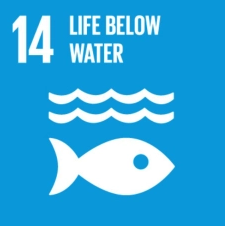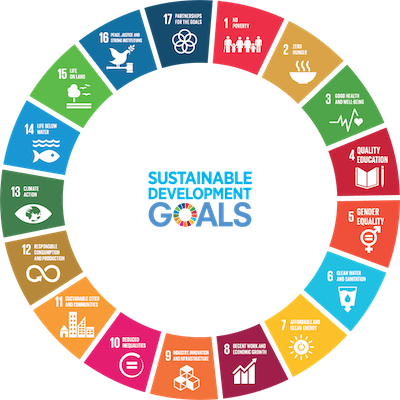SDG14: Life Below Water

The Sustainable Development Goals are a collection of 17 global goals set by the United Nations. The broad goals are interrelated though each has its own targets to achieve. The SDGs cover a broad range of social and economic development issues. These include poverty, hunger, health, education, climate change, gender equality, water supply, sanitation, energy, urbanization, environment and social justice.
The outcome document of the UN Summit on the 2030 Agenda: "Transforming our world: the 2030 Agenda for Sustainable Development", includes an emphasis "to protect the planet from degradation, including sustainable consumption and production, sustainably managing its natural resources and taking urgent action on climate change, so that it can support the needs of the present and future generations."
A full 30 percent of marine habitats have been destroyed, and 30 percent of the world's fish stocks are over-exploited. Marine pollution has reached shocking levels; each minute, 15 tons of plastic are released into the oceans. 20 percent of all coral reefs have been destroyed irreversibly, and another 24 percent are in immediate risk of collapse. Approximately 1 million sea birds, 100,000 marine mammals, and an unknown number of fish are harmed or die annually due to marine pollution caused by humans. It has been found that 95 percent of fulmars in Norway have plastic parts in their guts. Microplastics are another form of marine pollution.
The deterioration of coastal waters has become a global occurrence, due to pollution and coastal eutrophication (overflow of nutrients in water), where similar contributing factors to climate change can affect oceans and negatively impact marine biodiversity. "Without concerted efforts, coastal eutrophication is expected to increase in 20 per cent of large marine ecosystems by 2050.
Characterized by extinctions, invasions, hybridizations and reductions in the abundance of species, marine biodiversity is currently in global decline. "Over the past decades, there has been an exponential increase in human activates in and near oceans, resulting in negative consequences to our marine environment." Made evident by the degradation of habitats and changes in ecosystem processes, the declining health of the oceans has a negative effect on people, their livelihoods and entire economies, with local communities which rely on ocean resources being the most affected. Poor decisions in resource management can compromise conservation, local livelihood, and resource sustainability goals. "The sustainable management of our oceans relies on the ability to influence and guide human use of the marine environment."
Oceans alleviate the impact of climate change and absorb around 23% of the annual emissions of various forms of carbons, the most concerning being carbon dioxide. Because of the absorbed carbons, seawater becomes more acidic and its pH levels drops significantly. Ocean acidification puts coral reefs and other species in danger which impacts the marine food chain and ecosystem services including fisheries, transportation and even tourism.
Ocean Pollution with Scientific Center

The Economic Club held a seminar titled: "Saving the ocean from pollution". It was presented by Mr. Khalid Al Srayaa. The seminar goal is to tell about the causes & effects of ocean pollution & how you can help prevent it.
SEED Hosts First Seminar "Are we heading toward changes in water and electricity prices in Kuwait"

The Center for Sustainable Energy and Economic Development (SEED) at Gulf University for Science and Technology (GUST) hosted its first seminar of the 2021/22 academic year titled "Are we heading toward changes in water and electricity prices in Kuwait?". The two key speakers of the seminar were Instructor of Economics and Finance, Dr. Osama Al-Falah and Senior Analyst at Al-Khafji Joint Operations, Mr. Mohammad Ramadhan, who tackled a various questions regarding Kuwait's economic future with water and electricity.
Both speakers tackled topics such as why should Kuwait increase its water and electricity prices and how does it compare geographically in the region? This seminar was organized in coordination with the Economics Club, as a part of their "Sustainability Week" shedding light on energy and sustainability.
GUST for SDGs specific researches on sustainability
- Cuthbert, Ross N., et al. "Global economic costs of aquatic invasive alien species." Science of the Total Environment 775 (2021): 145238
Education for SDGs specific courses on sustainability
Have dedicated courses (full degrees, or electives) that address sustainability and the SDGs.Courses Related To SDGs
CAS = Collage of Arts and Sciences, CBA = Collage of Business Administration
| SDG | Collage | Course |
|---|---|---|
| SDG 14 - Life Below Water | CAS | BIOL 103 Environmental Biology 3.00 Examines the organization of natural ecosystem as it relates to the human community. Basic ecological principles are applied to current environmental issues. Among the topics to be examined are past and present uses and abuses of natural resources; environmental ethics and public policy; global environmental problems; human population growth; pollution; waste disposal; habitat loss; species extinction; and strategies for attaining a sustainable earth |

 Main Page
Main Page Download PDF
Download PDF